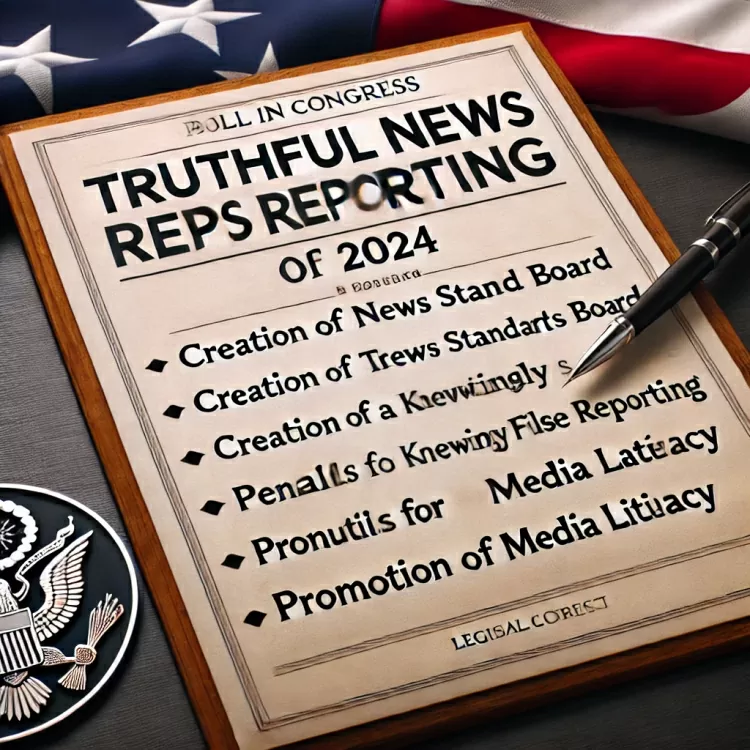Draft Bill: "Truthful News Reporting Act of 2024"
A Bill to Ensure Accountability in News Reporting and Combat Misinformation

Section 1. Short Title
This Act may be cited as the Truthful News Reporting Act of 2024.
Section 2. Purpose
The purpose of this Act is to ensure that news outlets in the United States provide accurate, verifiable information to the public. This Act aims to curb the spread of knowingly false or misleading information by news media organizations, protecting the public’s right to reliable news while preserving the integrity of free speech.
Section 3. Definitions
For the purposes of this Act:
- "Knowingly False or Misleading Information" refers to statements made by a news outlet that are factually incorrect, fabricated, or substantially misleading, where the outlet had knowledge of the falsehood or reckless disregard for its truth.
- "News Outlet" refers to any organization or platform (including television, radio, print, and digital media) that produces or distributes news content to the public.
- "Responsible Media Organization" refers to any news outlet that operates in compliance with widely recognized journalistic standards, including those set forth by the Society of Professional Journalists’ Code of Ethics or similar guidelines.
Section 4. Creation of the Truthful News Standards Board
-
Establishment: A Truthful News Standards Board (TNSB) is hereby established to monitor and review news content for compliance with accuracy standards. The Board shall be an independent body, free from undue political influence, and operate under the purview of the Federal Communications Commission (FCC).
-
Composition: The Board shall consist of journalists, legal experts, and media ethics specialists with experience in the field of news reporting and journalism. The members will be appointed by the President, subject to Senate confirmation.
-
Functions of the TNSB:
a. Develop and maintain a standard for identifying "knowingly false or misleading information" in news content.
b. Evaluate complaints and reports of false or misleading news stories, provide assessments, and publish findings.
c. Work with news outlets to promote accuracy, transparency, and ethical reporting.
d. Recommend penalties or corrective actions for outlets found to be in violation of the standards.
Section 5. Penalties for Knowingly False or Misleading Reporting
-
Monetary Fines: News outlets found to have knowingly published false or misleading information will be subject to fines of up to $1 million per incident, adjusted for inflation annually.
-
Corrective Actions: In addition to fines, offending outlets may be required to issue public corrections, clarifications, or retractions in a manner visible to their audience. The TNSB will determine the specifics of such actions based on the severity of the false information.
-
Ongoing Violations: Outlets found to have repeated offenses will be subject to increased penalties and may face restrictions on their broadcast licenses or distribution platforms.
Section 6. Safeguards and First Amendment Protections
-
Scope of Restrictions: This Act will not apply to opinion pieces, editorials, or other content clearly marked as non-factual or subjective. It focuses solely on factual news reporting and information dissemination.
-
Judicial Review: Any news outlet subject to fines or other penalties may appeal the decision to the courts. The courts will apply a strict standard of review to ensure that the penalties do not infringe on First Amendment rights.
Section 7. Public Education and Media Literacy
- Campaign for Media Literacy: The Federal Government shall allocate funding to a national campaign designed to educate the public about the importance of discerning credible news sources from misinformation and disinformation. The campaign will include resources for identifying false reporting, verifying facts, and supporting independent journalism.
Section 8. Implementation and Enforcement
-
Funding: The Truthful News Standards Board shall be funded through existing FCC allocations, with additional funding as necessary for its operations.
-
Reporting Requirements: The TNSB shall issue an annual report to Congress on its activities, including the number of complaints received, investigations conducted, and penalties assessed.
Section 9. Severability
If any provision of this Act is held to be unconstitutional or otherwise invalid, the remainder of the Act shall remain in full force and effect.
Section 10. Effective Date
This Act shall take effect one year after the date of its enactment.
Summary of the Bill’s Intent:
The bill aims to hold news outlets accountable for intentionally spreading false or misleading information, while respecting the protections of free speech. By establishing an independent board (TNSB) to monitor news accuracy, enforce penalties for violations, and promote journalistic integrity, it seeks to mitigate the harmful effects of misinformation. Additionally, it supports media literacy education to empower the public to identify credible news sources.
What's Your Reaction?

















